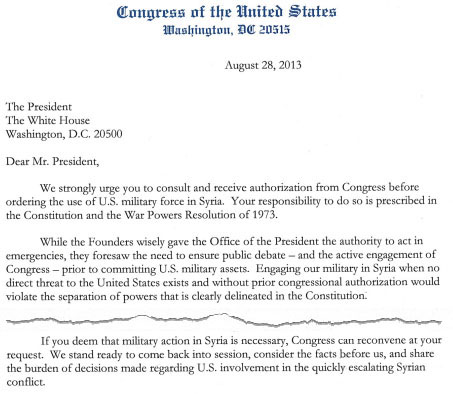
Medyan Dairieh/ZUMA
The drums of war are beating, as various news reports state that President Barack Obama and his European allies are close to launching some sort of military attack against Syria. But one question is how big the bang will be. The White House has signaled that whatever comes will be strictly a punitive strike in retaliation for the Assad regime’s presumed use of chemical weapons against civilians. It will not be an action aimed at toppling Bashar al-Assad or changing the overall strategic dynamic of the ongoing civil war in Syria. The supposed goal is to deter Assad from resorting to chemical weapons again. Foreign policy experts disagree—of course—on whether any assault of this nature would achieve that end, and such an action could have unintended consequences (say, a host of dead civilians) that might render it not a clear-cut success. But the band of neocons that led the United States into the Iraq War have quickly moved to seize on the administration’s inclination to mount a punitive strike in order to draw the nation further into the conflict in Syria.
On Wednesday, the Foreign Policy Initiative—which was started by Bill Kristol, Dan Senor, Robert Kagan, and other hawkish-minded policy wonks—sent a letter to Obama, urging him to slam Assad in response to the use of chemical weapons in Syria: “At a minimum, the United States, along with willing allies and partners, should use standoff weapons and airpower to target the Syrian dictatorship’s military units that were involved in the recent large-scale use of chemical weapons.”
But the letter—which was signed by Elliott Abrams, Fouad Ajami, Max Boot, Ellen Bork, Eliot Cohen, Douglas Feith, Joseph Lieberman, Clifford May, Joshua Muravchik, Danielle Pletka, Karl Rove, Randy Scheunemann, Kristol, Kagan, Senor, and dozens of others—demands that Obama go further. It calls on the president to provide “vetted moderate elements of Syria’s armed opposition” with the military support necessary to strike regime units armed with chemical weapons. That is, the neocons and their allies have CW-ized their pre-existing demand for the United States to arm the rebels.
And there’s more: “The United States and other willing nations should consider direct military strikes against the pillars of the Assad regime. The objectives should be not only to ensure that Assad’s chemical weapons no longer threaten America, our allies in the region or the Syrian people, but also to deter or destroy the Assad regime’s airpower and other conventional military means of committing atrocities against civilian non-combatants.” Plus, Obama should not only aid the rebels to thwart additional chemical weapons attacks; he should arm “moderate elements” of the opposition so that they can “prevail against” the Assad regime and the rebel factions affiliated with Al Qaeda or other Islamic extremists. In other words, get in whole hog.
Every sign from the White House indicates that the president does not want the United States to become a major participant in the Syrian conflict, let alone a key player in what could become a three-way civil war. It remains to be seen how Obama can thread the needle with a punitive strike that achieves its punitive goal but that does not lead to deeper US involvement in the war. But for the neocons and others—also signing the letter were Leon Wieseltier, Bernard-Henri Levy, and Tim Pawlenty—this is a moment to exploit. They want to turn a punitive strike into a commitment for war, and they have redeployed an argument from a decade ago: “The world—including Iran, North Korea, and other potential aggressors who seek or possess weapons of mass of destruction—is now watching to see how you respond.”
Here’s the full letter:
August 27, 2013
The Honorable Barack Obama
President of the United States of America
The White House
1600 Pennsylvania Avenue, NW
Washington, D.C. 20500Dear Mr. President:
Syrian dictator Bashar al-Assad has once again violated your red line, using chemical weapons to kill as many as 1,400 people in the suburbs of Damascus. You have said that large-scale use of chemical weapons in Syria would implicate “core national interests,” including “making sure that weapons of mass destruction are not proliferating, as well as needing to protect our allies [and] our bases in the region.” The world—including Iran, North Korea, and other potential aggressors who seek or possess weapons of mass of destruction—is now watching to see how you respond.
We urge you to respond decisively by imposing meaningful consequences on the Assad regime. At a minimum, the United States, along with willing allies and partners, should use standoff weapons and airpower to target the Syrian dictatorship’s military units that were involved in the recent large-scale use of chemical weapons. It should also provide vetted moderate elements of Syria’s armed opposition with the military support required to identify and strike regime units armed with chemical weapons.
Moreover, the United States and other willing nations should consider direct military strikes against the pillars of the Assad regime. The objectives should be not only to ensure that Assad’s chemical weapons no longer threaten America, our allies in the region or the Syrian people, but also to deter or destroy the Assad regime’s airpower and other conventional military means of committing atrocities against civilian non-combatants. At the same time, the United States should accelerate efforts to vet, train, and arm moderate elements of Syria’s armed opposition, with the goal of empowering them to prevail against both the Assad regime and the growing presence of Al Qaeda-affiliated and other extremist rebel factions in the country.
Left unanswered, the Assad regime’s mounting attacks with chemical weapons will show the world that America’s red lines are only empty threats. It is a dangerous and destabilizing message that will surely come to haunt us—one that will certainly embolden Iran’s efforts to develop nuclear weapons capability despite your repeated warnings that doing so is unacceptable. It is therefore time for the United States to take meaningful and decisive actions to stem the Assad regime’s relentless aggression, and help shape and influence the foundations for the post-Assad Syria that you have said is inevitable.
Sincerely,
Ammar Abdulhamid Dr. Robert Kagan Elliott Abrams Lawrence F. Kaplan Dr. Fouad Ajami James Kirchick Michael Allen Irina Krasovskaya Dr. Michael Auslin Dr. William Kristol Gary Bauer Bernard-Henri Levy Paul Berman Dr. Robert J. Lieber Max Boot Senator Joseph I. Lieberman Ellen Bork Tod Lindberg Ambassador L. Paul Bremer Mary Beth Long Matthew R. J. Brodsky Dr. Thomas G. Mahnken Dr. Eliot A. Cohen Dr. Michael Makovsky Senator Norm Coleman Ann Marlowe Ambassador William Courtney Clifford D. May Seth Cropsey Dr. Alan Mendoza James S. Denton Dr. Joshua Muravchik Paula A. DeSutter Andrew Natsios Dr. Larry Diamond Governor Tim Pawlenty Dr. Paula J. Dobriansky Martin Peretz Thomas Donnelly Danielle Pletka Dr. Michael Doran Dr. David Pollock Mark Dubowitz Arch Puddington Dr. Colin Dueck Karl Rove Dr. Nicholas Eberstadt Randy Scheunemann Ambassador Eric S. Edelman Dan Senor Douglas J. Feith Ambassador John Shattuck Reuel Marc Gerecht Lee Smith Abe Greenwald Henry D. Sokolski Christopher J. Griffin James Traub John P. Hannah Ambassador Mark D. Wallace Dr. William Inboden Michael Weiss Bruce Pitcairn Jackson Leon Wieseltier Ash Jain Khawla Yusuf Dr. Kenneth Jensen Robert Zarate Allison Johnson Dr. Radwan Ziadeh Ambassador Robert G. Joseph
















